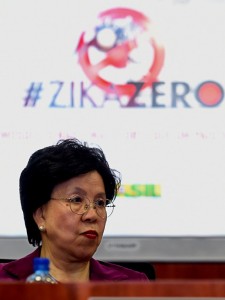
BRASILIA, Brazil (AFP) — The head of the World Health Organization said Tuesday she is confident Brazil can host the Rio Olympics safely despite the Zika threat, though she warned of a long battle against the mosquito-borne virus.
Margaret Chan, who was in Brazil for a 48-hour visit, praised the Brazilian government’s efforts to stamp out mosquitoes and its coordination with various international bodies, including the WHO and the International Olympic Movement, ahead of the Games’ kick-off on August 5.
We must “make sure that people who come here either for the Games as a visitor, as a participant or athletes, will get the maximum protection they need. And I’m confident that the government can do it,” she said after meeting with President Dilma Rousseff and several ministers in the capital Brasilia.
But Chan also said it will be a long, hard fight to stamp out the virus, which is strongly suspected of causing a serious birth defect in babies born to mothers infected while pregnant.
“The Zika virus is very tricky, very tenacious, very difficult. And so is the Aedes aegypti mosquito,” Chan said.
“We have learnt lessons from dengue and from chikungunya outbreaks in the past, so we should expect to see more cases, we should expect this is going to be a long journey.”
Brazil is at the center of a Zika outbreak, with 1.5 million people infected, and authorities have also recorded a spike in microcephaly, a congenital condition that causes abnormally small heads and hampers brain development.
– ‘ZikaZero’ campaign –
On Tuesday, Brazil’s health ministry reported 583 confirmed cases of babies with microcephaly since October, compared to an annual average of 150.
That was a 14.7 percent rise over the number of confirmed cases the previous week, and authorities were investigating another 4,107 possible cases.
An estimated 120 babies have died due to the birth defect, the ministry said.
Cases of active Zika transmission have been reported in 28 countries and territories in the Americas and Caribbean.
In most people, the illness causes only mild flu-like symptoms.
Countries throughout the region have launched massive operations to eliminate pools of stagnant water where the mosquitoes, which also spread dengue and chikungunya viruses, can breed.
Brazil has mobilized some 55,000 members of its armed forces to join 310,000 health workers in its “ZikaZero” campaign.
Tens of thousands of other troops fanned out across the country to hand out leaflets, part of a massive public education effort.
There is currently no cure against the Zika virus and large-scale trials of vaccines in development are still at least 18 months away.
It could take months to confirm if Zika causes microcephaly in babies born to mothers infected while pregnant, though the WHO has said evidence is growing.
Researchers are also studying if there is a link between Zika and a rise in cases of the paralysis-causing Guillain-Barre syndrome.
In the United States, health authorities are also investigating 14 new cases of Zika virus that may have been sexually transmitted.
The WHO had previously warned that Zika’s spread could be “explosive,” infecting up to four million people, and has called the outbreak an international health emergency.
dw/acb/oh/ec
© 1994-2016 Agence France-Presse








